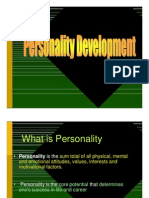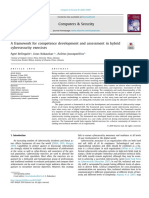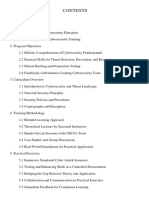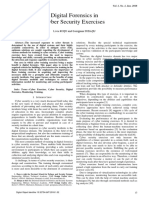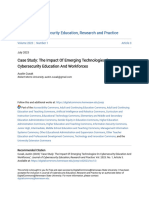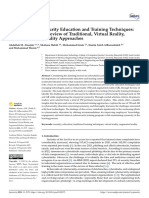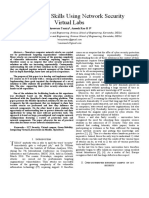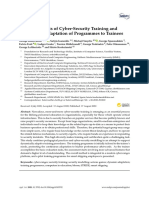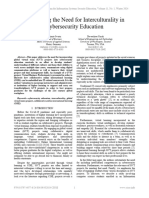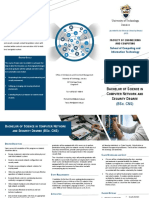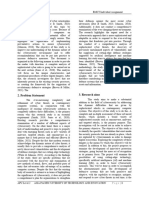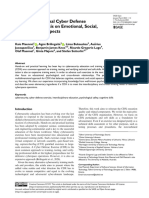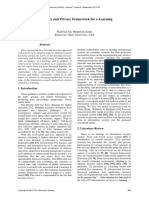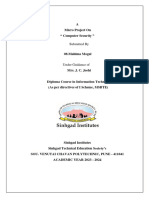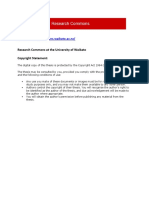CISSE v011 I01 p10
CISSE v011 I01 p10
Uploaded by
ganusakbogdan88Copyright:
Available Formats
CISSE v011 I01 p10
CISSE v011 I01 p10
Uploaded by
ganusakbogdan88Original Title
Copyright
Available Formats
Share this document
Did you find this document useful?
Is this content inappropriate?
Copyright:
Available Formats
CISSE v011 I01 p10
CISSE v011 I01 p10
Uploaded by
ganusakbogdan88Copyright:
Available Formats
2024 Journal of The Colloquium for Information Systems Security Education, Volume 11, No.
1, Winter 2024
Impact of a Cybersecurity Work-Related Course on
Students' Career Thoughts and Attitudes:
A PISCES Course Evaluation
Dr. Marcia Combs Dr. Randall Joyce Mr. Cain Bynum
Cybersecurity Management Cybersecurity and Cybersecurity Management
Murray State University Network Management Graduate Program
Murray, KY, United States Murray State University Murray State University
mcombs@murrystate.edu Murray, KY, United State Murray, Kentucky, USA
0000-0001-6052-3602 rjoyce@murraystate.edu cainbynum@aol.com
0000-0002-1573-7051 0009-0004-9189-5459
Abstract—This article proposes a research study conducted Experiential Learning Theory (ETL) is defined as the process
at Murray State University Cybersecurity and Network whereby knowledge is created through the combination of
Management program to investigate the impact of work- grasping and transforming experience often ETL is referred
related experiential learning on college students' career to as learning through actions and discovery [2, 3]. In the
thoughts and attitudes within the context of cybersecurity field of cybersecurity using experiential learning to teach the
career development. The Cybersecurity and Network skills cybersecurity professionals need to do their job
Management program introduced the CNM 518 course based efficiently and adequately is critical in addressing the
on the Public Infrastructure Security Cyber Education System
workforce gap and producing quality professionals.
(PISCES) project that offers practical, hands-on experiences.
The proposed research project slated for Spring 2024, aims to A. Work-Related Experiential Learning in Cybersecurity
assess how this work-related experiential learning influences
In the spring of 2023, the CNM program introduced both
students' career thoughts and attitudes, using the Career
Thoughts Inventory as a measurement tool. This research
on-campus and online sections of the CNM 518 Threat
project emphasizes the importance of reflective learning within Hunting and Security Operations course. CNM 518 is a
CNM 518 and aims to contribute empirical evidence on the work-related experiential learning course where students
impact of work-related experiential learning on students' delve into the various stages of addressing a cybersecurity
career thoughts and how such learning experiences positively incident within a security operations center, encompassing
influence the career decision-making processes and, both technical and managerial responsibilities. Proficiencies
subsequently, the broader field of cybersecurity education. acquired in this course encompass understanding the origins
of a breach, pinpointing compromised systems,
Keywords—PISCES, Career Development, Work-Related implementing containment measures, and proactively
Experiential Learning, Cybersecurity, Security Operation Center identifying additional breaches. Furthermore, this course
introduces students to industry-standard incident response
I. INTRODUCTION tools and methodologies, with a particular emphasis on log
Murray State University, situated in western Kentucky, is analysis, network examination, and forensic techniques.
a mid-sized public institution. As of October 2022, had a total
Historically, experiential learning in cybersecurity has
enrollment of 9,489 students, spanning both undergraduate
taken the form of case-studies, capture-the-flag activities, and
and graduate programs [1]. One of MSU’s notable programs
interactive games, all aimed at actively engaging and
is Cybersecurity and Network Management (CNM),
fostering students' interest in the field [3-6]. CNM 518
previously recognized as Telecommunication and Systems
deviates from the conventional approach to cybersecurity
Management (TSM), which was established in 1998. This
experiential learning by integrating a pedagogical work-
program holds the status of being a Murray State University
related design built upon the foundation of the Public
Program of Distinction. Since its inception, the CNM
Infrastructure Security Cyber Education System (PISCES)
program has been dedicated to teaching knowledge and skills
project. PISCES offers students a practical, work-related
in the field of cybersecurity. The CNM program, situated
experiential learning opportunity with the aim equipping the
within the School of Engineering, is a 120-credit program
next generation of cybersecurity analysts with practical and
available in both online and on-campus formats. The core
experiential knowledge, facilitated through a unique
courses in the CNM program encompass a broad range of
collaboration with the company Critical Insight [7, 8].
cybersecurity subjects, including but not limited to Internet
Together, they have developed a network monitoring
of Things, Digital Forensics, Incident Response, Threat
solution tailored for small communities, municipalities, and
Hunting, and Security Operations. The CNM program offers
modest-sized healthcare agencies. This solution empowers
students numerous experiential learning opportunities such
students to monitor segments of network traffic, enabling
as internships, study abroad, and problem-based learning.
979-8-8797-4077-6/24/$36.00 ©2024 CISSE 1 www.cisse.info
2024 Journal of The Colloquium for Information Systems Security Education, Volume 11, No. 1, Winter 2024
them to identify anomalies and potential indicators of The course spanned a duration of 16 weeks, involving
compromise [9]. Amid the escalating frequency of two-hour and fifteen-minute sessions each week. The initial
cyberattacks and the persistent shortage of cybersecurity PISCES student Spring 2023 cohort consisted of nine
professionals, the imperative of offering experiential learning participants with 22% female and 68% male. As the course
experiences cannot be overstated. neared its conclusion, students were encouraged to
participate in an evaluation process where they provided
As the CNM 518 course was specifically designed to qualitative feedback on both the faculty and the course itself.
align with the PISCES project, the adoption of an The following is some of the feedback from the students.
Experiential Learning (ETL) model became essential to fully
leverage the hands-on learning opportunities within the “The course allowed me to work with tools that I have
course. The course modules were meticulously crafted using never used before, being able to use them and do multiple
the Kolb learning cycle approach, a methodology that has things was really cool.”
demonstrated success in other cybersecurity programs [3, 4,
6]. “The lab assignments and walkthroughs really helped
with the courses and being able to create the dashboards and
The Kolb learning cycle approach encompasses four visualizations helped with my learning.”
sequential stages: concrete experience, reflective
observation, abstract conceptualization, and active “More hands-on activities in the PISCES will help get
experimentation [4, 10, 11]. With this approach, the course more used to using Elastic.”
modules were structured to immerse students in the role of a CNM 518 is scheduled for another offering in the spring
cybersecurity analyst, allowing them to cultivate their of 2024. In an effort to align it more closely with Kolb's
proficiency with the tools and analytical capabilities essential experiential learning theory [11], the following adjustments
to the field. Within each module, a novel analyst or threat- will be added with the goal of creating positive attitudes
hunting skills or tool was introduced and briefly showcased. toward the student's skill set in the PISCES environment
Subsequently, students were tasked with independently while encouraging growth in the field.
replicating the demonstrated activities within their own
learning environments. Supplementary resources, including • Adding new reflection assignments to the modules to
readings and tutorials, were provided to augment the content help students identify negative thoughts about labs in
covered during demonstrations and lectures. Armed with PISCES.
freshly acquired knowledge and skills, students were • Adding on-demand recordings of PISCES Lab
encouraged to further test their skills in the PISCES walkthroughs with the lab assignments.
environment, exploring its intricacies and pushing the
boundaries of what they could uncover. Each module in the • Create group work PISCES lab assignments.
course facilitated students in traversing all four stages of the
learning cycle, a process visually depicted in Fig. 1.
Fig. 1. Kolb’s Learning Cycle
979-8-8797-4077-6/24/$36.00 ©2024 CISSE 2 www.cisse.info
2024 Journal of The Colloquium for Information Systems Security Education, Volume 11, No. 1, Winter 2024
CNM 518 reflective question assignments are based on career or work behavior” [13]. Life-span career
the Career Thoughts Inventory (CTI) workbook schema “to developmental theorist, Dan Super, defined five life and
identify, challenge, and alter any negative career thoughts career developmental stages, growth (age 0-14), exploration
and then follow up with action” [12]. Example reflection (age 15-24), establishment (age 25-44), maintenance (age 45-
question is listed below: 64), and decline (age 65+) [14]. Traditional college students
fall within the exploration stage of Super’s Life Rainbow
• Reflect on your PISCES lab assignment XX. Were where emerging adults [15] are developing vocational self-
there moments when you encountered negative concepts that reflect their occupation preference and ability
thoughts or self-doubt about your abilities or level [13]. According to the Cognitive Information
decisions? Can you describe these thoughts and the Processing (CIP) Theory, vocational self-concept is situated
specific situations that triggered them? within both the executive processing domain and the
• Think about how you addressed the negative career knowledge domain. The executive knowledge domain
thoughts during the PISCES lab assignment XX. centers on metacognitions, including aspects like self-talk
How did you challenge these thoughts, and what and self-awareness. In contrast, the knowledge domain
strategies did you use to improve your decision- concentrates on self-knowledge (employment preferences)
making abilities? Share any instances where you and occupational knowledge (education and training) [16].
overcame self-doubt and made a well-informed CNM 518 was first introduced in the spring of 2023 with
decision. a modest enrollment of nine students. While this represents a
• Describe an example where you transformed a relatively small sample size, it serves as the basis for
negative thought into a positive action during the collecting data to explore the course's impact on student
PISCES lab assignment XX. How did this positive career development based on the CIP executive knowledge
action contribute to your overall experience and domain. This paper proposes a new 2024 study to explore the
outcomes? Additionally, discuss how you made connection between work-related experiential learning CNM
effective use of support from colleagues, mentors, or 518 and its impact on CIP executive processing domain, with
peers to enhance your learning and decision-making. a focus on assessing students' career thoughts and attitudes.
The primary objective of the proposed research project is to
By engaging in this project, students gain invaluable examine how work-related experiential learning influences
experience in using industry-standard tools and working with students' career thoughts and attitudes, utilizing the Career
substantial volumes of data within a security operations Thoughts Inventory (CTI) [12] as a measurement tool. The
center environment. This hands-on exposure prepares them proposed research seeks to gain insights into the potential
effectively for their future careers in the cybersecurity field impact of work-related experiential learning on career-
[8, 9]. In the realm of cybersecurity, gaining practical, hands- related cognitive patterns and contribute valuable knowledge
on experience is pivotal in preparing students for the to the fields of education and career development.
workforce and fostering their deep engagement and
cybersecurity career development. The outline for the remaining sections of the articles
includes a review of career development and work-related
The CNM program offers students another experiential experiential learning literature, an overview of the proposed
learning course. CNM 411 is a problem-based experiential research methodology, and conclusion.
learning course that covers the technical and pragmatic
aspects of network design, operations, and management. II. LITERATURE REVIEW
Serving as the culmination of the undergraduate In the realm of exploring the connection between work-
Cybersecurity and Network Management program, this based experiential learning and students' attitudes toward
course explores and applies technologies, tools, and making career decisions, there is a lack of comprehensive
methodologies relevant to network managers. The research. A 2013 study [17] examined the effect of an
curriculum covers critical aspects such as efficiency, agricultural project-based and work-based learning
performance, reliability, risk management, disaster recovery, experience on undergraduate participants vocation identity,
and security. The course involves a substantial network career decision self-efficacy and career maturity. Vocational
design project and the examination of a real-world case study identity reflects an individual’s sense of their goals, interests,
for assessment and practical application. skills, and confidence in making career choices [18]. Career
B. Cybersecurity and Career Development decision self-efficacy is the individual’s belief they can
successfully complete tasks in making career choices [19]
As Murray State University's CNM program advances while career maturity is the degree individuals are prepared
and broadens its range of experiential learning courses, to make vocational decisions [20]. The findings of this
particularly emphasizing their dedication to work-related project-based and work-based learning experience helped
courses, a fundamental question arises: What impact do these define students’ career interests and career goals and suggests
work-related courses have on students' career development? the experience had a positive effect on vocational identity and
Career development spans a person’s lifetime beginning career decision self-efficacy but no measurable impact on
in childhood and continues to retirement and is defined as “a career maturity. This study was grounded in the
concept designed to capture the dynamic, changing nature of
979-8-8797-4077-6/24/$36.00 ©2024 CISSE 3 www.cisse.info
2024 Journal of The Colloquium for Information Systems Security Education, Volume 11, No. 1, Winter 2024
constructivist theory and did not delve into students' beliefs As discussed earlier, CNM 518 Threat Hunting and
and attitude responses regarding career development. Security Operations Center Management is a work-related
experiential learning course where students delve into the
Orthogonal research includes career development based
various stages of addressing a cybersecurity incident within
on early career income and workplace promotion. 2023 study
a security operations center, encompassing both technical
investigated the relationship between work-based learning
and managerial responsibilities. CNM 518 is built upon the
and students’ early career income [21]. Using a dataset from
foundation of the PISCES project, offering students a
the National Centre of Education Statistic (NCES), found
practical, work-related experiential learning opportunity.
high school students who participated in at least one work-
CNM 411 is problem-based experiential learning course that
based learning such as job shadowing, community service,
covers the technical and pragmatic aspects of network
cooperative education, internships could expect a 7% higher
design, operations, and management. Serving as the
income than those who did not participate in work-based
culmination of the undergraduate Cybersecurity and
learning. In 1986 a five-year longitude study [22] found a
Network Management program, this course explores and
positive correlation in an experiential learning business
applies technologies, tools, and methodologies relevant to
management simulation game. In the game the participants'
network managers. The curriculum covers critical aspects
participants' performance was connected to the participants
such as efficiency, performance, reliability, risk
workplace promotion rates and career satisfaction in the
management, disaster recovery, and security.
game.
The Career Thoughts Inventory (CTI) [12] has been
Another research project in experiential learning
shown to be a reliable and valid measure of career related
demonstrated study abroad had a positive effect on students’
negative thoughts, beliefs, attitude and dysfunctional
vocational identity and career decision-making [23]. The
thinking for adults, college students, and high school
study revealed that studying abroad significantly impacted
students. The CTI is a 48-item self-administered assessment
college students' self-knowledge, which, in turn, played a
that provides a total score (CTI Total Score) as well as scores
pivotal role in shaping their career options. However, it's
for three construct scales: Decision Making Confusion
important to note that this study did not address the issue of
(DMC), Commitment Anxiety (CA), and External Conflict
students' career related negative self-talk, attitudes, or beliefs.
(EC). Individuals with higher CTI Total Scores are less likely
A study [24] investigating the relationship of mindfulness to have a clear perception of their career goals, less likely to
on decision-making styles, negative career thoughts, and be informed about occupation and uncertain about career
vocational identity suggest that individuals higher in choice. College students with higher CTI Total Scores are
mindfulness and those with thinking-based and internal less decisive and are prone to feelings of depression. The
decision-making styles experience fewer negative career three constructs reflect the individual’s inability to make a
thoughts and higher levels of vocational identity. career decision due to overwhelming negative thoughts
Mindfulness like the CIP theory executive domain (DMC), inability to make a commitment to a specific career
emphasizes how negative career thoughts affect the career (CA), inability to balance the importance of their own self-
decision making process [25]. This study aligns with the perceptions and the input from others (EC). The CTI uses a
intended purpose of the proposed research project in terms of Likert scale with responses ranging from “strongly disagree”
examining participants' thoughts and attitudes. However, it's (0) to “strongly agree” (3) and the total score can range from
worth noting that this study focused on teaching mindfulness 0 to 144. The CTI can be administered in 7 to 15 minutes and
within a career counseling context, rather than within an can be scored in 5 to 10 minutes.
experiential learning context.
The hypothesis statements for the research project are as
There seems to be a noticeable gap in research, follows:
particularly regarding the intersection of work-related
• H0: There is no significant difference in Career
experiential learning and college students' self-talk, attitudes,
Thoughts Inventory (CTI) scores between students
and beliefs in career development. Consequently, the primary
who participate in work-related experiential learning
aim of this proposed research project is to explore the
(Group A) and those who do not (Group B).
relationship between the PISCES work-related experiential
learning experience and college students' attitudes toward • H1: There is a significant difference in Career
career development. Thoughts Inventory (CTI) scores between students
who participate in work-related experiential learning
III. PROPOSED METHODOLOGY (Group A) and those who do not (Group B).
This research project proposes a control group study to
It is expected that both the sample size for each group will
assess and compare the CTI scores of two distinct groups.
be less than 30, therefore a Mann-Whitney U test will be
The experimental group (Group A) will participate in a senior
employed to analyze and compare the distributions of CTI
level work-related experiential learning course (CNM 518)
scores, allowing us to either accept or reject the null
while the control group (Group B) will participate in a senior
hypothesis.
level problem-based experiential learning course (CNM
411). If U statistic ≤ critical U value, the null hypothesis (H0)
will be rejected meaning there is a significant difference in
979-8-8797-4077-6/24/$36.00 ©2024 CISSE 4 www.cisse.info
2024 Journal of The Colloquium for Information Systems Security Education, Volume 11, No. 1, Winter 2024
CTI scores between the two groups. If U statistic > critical U IEEE IntegratedSTEM Education Conference (ISEC). 2019. IEEE.
value, the null hypothesis is accepted meaning there is no https://doi.org/10.1109/ISECon.2019.8882112
significant difference in CTI scores between the two groups. [6] Konak, A., Experiential learning builds cybersecurity self-efficacy in
K-12 students. Journal of Cybersecurity Education, Research and
This research project is tentatively set for Spring 2024 Practice, 2018. 2018(1): p. 6.
with data collection of students’ CTI scores pre and post [7] Public Infrastructure Security Cyber Education System (PISCES).
CNM 518 and 411 course completions. CNM 411 students 2023 24 July, 2023]; Available from: https://pisces-
intl.org/about/pisces.
who have completed CNM 518 are excluded from the
[8] Hamilton, M., CI Security Partners PISCES to Provide a Public
research. The CTI instrument will be delivered either Option for Cybersecurity Monitoring. 2018, Critical Insight.
hardcopy/paper or electronic, depending on copyright [9] Tsikerdekis, M., S. Waldron, and A. Emanuelson, Network anomaly
approval. An IRB proposal will be submitted to Murray State detection using exponential random graph models and
University IRB committee for review and approval prior to autoregressive moving average. IEEE Access, 2021. 9: p. 134530-
Spring 2024. 134542. https://doi.org/10.1109/ACCESS.2021.3116575
[10] Kolb, A.Y. and D.A. Kolb, Experiential learning theory as a guide
IV. CONCLUSION for experiential educators in higher education. Experiential
Learning & Teaching in Higher Education, 2017. 1(1): p. 7-44.
In conclusion, the CNM 518 course through PISCES https://doi.org/10.46787/elthe.v1i1.3362
offers students a valuable opportunity for self-growth and [11] Kolb, D.A., Experiential learning: experience as the source of
confidence in their career pathway through the completion of learning and development. 1984, Englewood Cliffs, NJ: Prentice
practical labs in PISCES and reflection assignments. These Hall.
assignments encourage students to identify, challenge, and [12] Sampson Jr, J.P., et al., Career Thoughts Inventory professional
transform negative career thoughts into positive actions, manual. Lutz, FL: Psychological Assessment Resources. Inc.(PAR),
ultimately enhancing their decision-making skills and overall 1996.
learning experience. Furthermore, this research project, set [13] Brown, S.D. and R.W. Lent, Career development and counseling:
Putting theory and research to work. 2004: John Wiley & Sons.
for Spring 2024, aims to provide empirical evidence
[14] Super, D.E., A life-span, life-space approach to career development,
regarding the impact of work-related experiential learning on in Career choice and development: Applying contemporary theories
students' career thoughts and decision-making. By to practice, 2nd ed. 1990, Jossey-Bass: San Francisco, CA, US. p.
comparing CTI scores between Group A (CNM 518 197-261.
participants) and Group B (CNM 411 participants), the study [15] Arnett, J., Emerging Adulthood: The Winding Road from the Late
seeks to test the hypothesis that work-related experiential Teens Through the Twenties (2nd edition). 2019.
learning positively influences students' career thoughts. The [16] Sampson, J.P., et al., Introduction to Cognitive Information
Mann-Whitney U test will be employed to analyze and Processing Theory, Research, and Practice. 2020.
compare the distributions of CTI scores, allowing us to either [17] Esters, L. and M. Retallick, Effect of an experiential and work-based
accept or reject the null hypothesis. In summary, this research learning program on vocational identity, career decision self-
efficacy, and career maturity. Career and Technical Education
project not only highlights the importance of reflective Research, 2013. 38(1): p. 69-83. https://doi.org/10.5328/cter38.1.69
learning within CNM 518 but also contributes to the broader [18] Vocational Identity - IResearchNet. 2016 2016-09-18 [cited 2023
understanding of how experiential learning can positively September 15]; Available from:
influence students' career thoughts and decision-making https://psychology.iresearchnet.com/counseling-psychology/identity-
processes. The results of this study will provide valuable development/vocational-identity/.
insights for both educators and students in the field of [19] Career Decision Self-Efficacy Scale - IResearchNet. 2016 2016-02-
cybersecurity and digital forensics and the impact of the 04 [cited 2023 September 15]; Available from:
https://psychology.iresearchnet.com/counseling-psychology/career-
PISCES project. assessment/career-decision-self-efficacy-scale/.
REFERENCES [20] Career Maturity - IResearchNet. 2016 2016-02-07 [cited 2023
September 15]; Available from:
[1] Murray State Student Data. 2023 [cited 2023 September 12]; https://psychology.iresearchnet.com/counseling-psychology/career-
Available from: counseling/career-maturity/.
https://murraystate.edu/about/administration/Provost/institutional- [21] Plasman, J. and C. Thompson, The value of informal learning within
effectiveness/OfficeOfInstitutionalResearch/MSUStudentData.aspx. work-based learning: The economic benefits of WBL. International
[2] Kolb, D.A., Experience as the source of learning and development. Journal of Training and Development.
Upper Saddle River: Prentice Hall, 1984. [22] Wolfe, J. and C.R. Roberts, The external validity of a business
[3] Rege, A. Multidisciplinary experiential learning for holistic management game: A five-year longitudinal study. Simulation &
cybersecurity education, research and evaluation. in 2015 USENIX Games, 1986. 17(1): p. 45-59.
Summit on Gaming, Games, and Gamification in Security Education https://doi.org/10.1177/0037550086171004
(3GSE 15). 2015. [23] Kronholz, J.F. and D.S. Osborn, The impact of study abroad
[4] Melnikovas, A., et al. Teaching pentesting to social sciences experiences on vocational identity among college students.
students using experiential learning techniques to improve attitudes Frontiers: The Interdisciplinary Journal of Study Abroad 2016. 27:
towards possible cybersecurity careers. in European conference on p. 70-84. https://doi.org/10.36366/frontiers.v27i1.375
cyber warfare and security: Proceedings of the 22nd European [24] Galles, J., et al., Mindfulness and decision-making style: Predicting
conference on cyber warfare and security. 2023. Academic career thoughts and vocational identity. The Career Development
Conferences International Limited. Quarterly, 2019. 67(1): p. 77-91. https://doi.org/10.1002/cdq.12164
https://doi.org/10.34190/eccws.22.1.1145
[25] Sampson, J.P., et al., Career counseling and services: A cognitive
[5] Rege, A., K. Williams, and A. Mendlein. An experiential learning information processing approach. 2004: Thomson/Brooks/Cole
cybersecurity project for multiple STEM undergraduates. in 2019 Belmont, CA.
979-8-8797-4077-6/24/$36.00 ©2024 CISSE 5 www.cisse.info
You might also like
- Evaluating Research in Academic Journals PDFDocument218 pagesEvaluating Research in Academic Journals PDFJeremiahOmwoyo100% (4)
- Ebook PDF Understanding Human Differences Multicultural Education For A Diverse America 5th Edition PDFDocument41 pagesEbook PDF Understanding Human Differences Multicultural Education For A Diverse America 5th Edition PDFferne.bass217100% (40)
- Thematic Apperception TestDocument41 pagesThematic Apperception Testcj67% (3)
- Personality Development PDFDocument15 pagesPersonality Development PDFblitzkrig100% (12)
- Assignement Sks Conference PaperDocument6 pagesAssignement Sks Conference Papersyakirin3802No ratings yet
- BethSecure - Ensuring Data Security in Cloud ComputingDocument20 pagesBethSecure - Ensuring Data Security in Cloud ComputingMD RAIYAN KHALIDNo ratings yet
- CISSE v011 I01 p15Document5 pagesCISSE v011 I01 p15ganusakbogdan88No ratings yet
- 10 1016@j Cose 2019 101607Document13 pages10 1016@j Cose 2019 101607Junet AjaNo ratings yet
- Teaching Computer Science With Cybersecurity Education Built-InDocument8 pagesTeaching Computer Science With Cybersecurity Education Built-InناصرھرەNo ratings yet
- Reference FileDocument10 pagesReference Filevidope9199No ratings yet
- Revista Indonesia de Ingeniera Elctrica y Ciencias de La ComputacinDocument10 pagesRevista Indonesia de Ingeniera Elctrica y Ciencias de La ComputacinLINDA CAROL CALDERON AREVALONo ratings yet
- Digital Forensics in Cyber Security Exercises-MinDocument6 pagesDigital Forensics in Cyber Security Exercises-Minjoseph michaelNo ratings yet
- Case Study On Cybersecurity SampleDocument14 pagesCase Study On Cybersecurity Sampleresilient5692No ratings yet
- CISSE v011 I01 p2Document5 pagesCISSE v011 I01 p2ganusakbogdan88No ratings yet
- Symmetry 15 02175Document25 pagesSymmetry 15 02175niyexahehcxsvkharkNo ratings yet
- My Booklet - Cyber-SecurityDocument18 pagesMy Booklet - Cyber-SecuritydakabuuNo ratings yet
- Cybersecurity Education: Evolution of The Discipline and Analysis of Master ProgramsDocument12 pagesCybersecurity Education: Evolution of The Discipline and Analysis of Master ProgramsSAMI PENo ratings yet
- A Tailored Model For Cyber Security Education Utilizing A Cyber RangeDocument13 pagesA Tailored Model For Cyber Security Education Utilizing A Cyber RangevamsidayyalaNo ratings yet
- Cybersecurity Skills Using Network Security Virtual Labs: Shreevasa Tantry, Aneesh Rao H SDocument7 pagesCybersecurity Skills Using Network Security Virtual Labs: Shreevasa Tantry, Aneesh Rao H SUdupiSri groupNo ratings yet
- Cyber Security: CATALOG 2020/2021Document10 pagesCyber Security: CATALOG 2020/2021Rainanda MarselNo ratings yet
- CISSE v011 I01 p14Document9 pagesCISSE v011 I01 p14ganusakbogdan88No ratings yet
- Ruiz (2019) A Study of theUK Undergraduate Computer Science Curriculum - A Vision of Cyber SecurityDocument8 pagesRuiz (2019) A Study of theUK Undergraduate Computer Science Curriculum - A Vision of Cyber SecurityIvan BornacellyNo ratings yet
- Factors Affecting Cybersecurity Awareness AmongDocument21 pagesFactors Affecting Cybersecurity Awareness Amongdevid mandefroNo ratings yet
- Cyber Security: CATALOG 2019/2020Document8 pagesCyber Security: CATALOG 2019/2020Aulia RidhoNo ratings yet
- Applied Sciences: Modern Aspects of Cyber-Security Training and Continuous Adaptation of Programmes To TraineesDocument26 pagesApplied Sciences: Modern Aspects of Cyber-Security Training and Continuous Adaptation of Programmes To TraineesGhofrane FerchichiNo ratings yet
- The NCCs Role in Cyber Security AwarenessDocument10 pagesThe NCCs Role in Cyber Security AwarenessshaunmammenlolNo ratings yet
- CISSE v011 I01 p1Document5 pagesCISSE v011 I01 p1suzannewilson5678No ratings yet
- Re-Engineering Cybersecurity Education in The US: An Analysis of The Critical FactorsDocument9 pagesRe-Engineering Cybersecurity Education in The US: An Analysis of The Critical FactorsCom DigfulNo ratings yet
- Technology Internship Program ICSSDocument2 pagesTechnology Internship Program ICSSPriyanka 283No ratings yet
- Teaching The Cybersecurity CoursesDocument4 pagesTeaching The Cybersecurity CoursesInternational Journal of Innovative Science and Research TechnologyNo ratings yet
- Project KimaruDocument14 pagesProject KimaruomarisaidisalimNo ratings yet
- Cyber Security: Course SummaryDocument17 pagesCyber Security: Course SummaryalikhanNo ratings yet
- Putra 2020Document6 pagesPutra 2020Simegnew TizazuNo ratings yet
- JCC 2021111614560501Document14 pagesJCC 2021111614560501asmm.rahamanNo ratings yet
- CISSE v011 I01 p7Document9 pagesCISSE v011 I01 p7ganusakbogdan88No ratings yet
- BSC CNS - BrochureDocument2 pagesBSC CNS - BrochureChaise JohnsonNo ratings yet
- Blazic (2021) - The Cybersecurity Labour Shortage in EuropeDocument13 pagesBlazic (2021) - The Cybersecurity Labour Shortage in EuropeIvan BornacellyNo ratings yet
- MSIS Year in Review 2019-2020Document20 pagesMSIS Year in Review 2019-2020Waqas BukhariNo ratings yet
- CSCloud 2015 71-63Document5 pagesCSCloud 2015 71-63AnanyaNo ratings yet
- Iris Rieff MSC Thesis PDFDocument122 pagesIris Rieff MSC Thesis PDFmundotechNo ratings yet
- Claned ZharBiz Cyber Security For Leaders CourseDocument4 pagesClaned ZharBiz Cyber Security For Leaders CourseRobert RainmanNo ratings yet
- MSC in Cybersecurity 24-25Document2 pagesMSC in Cybersecurity 24-25Sagh TomNo ratings yet
- Information 12 00417 v2Document20 pagesInformation 12 00417 v2Momoh GaiusNo ratings yet
- Problem Statement 3. Research AimsDocument5 pagesProblem Statement 3. Research Aimsluaitest1No ratings yet
- Iris Rieff Thesis ArticleDocument14 pagesIris Rieff Thesis ArticleAllison Tomas GuzmanNo ratings yet
- Case Studies in Cybersecurity PDFDocument26 pagesCase Studies in Cybersecurity PDFshanysunnyNo ratings yet
- 7 - A Holistic Cybersecurity Maturity Assessment Framework For Higher Education Institutions in The United KingdomDocument15 pages7 - A Holistic Cybersecurity Maturity Assessment Framework For Higher Education Institutions in The United KingdomPhenyoNo ratings yet
- Global Ace v6 2022 CCASEDocument1 pageGlobal Ace v6 2022 CCASEnasriqshahpekanNo ratings yet
- Cyber Security Study Plan FUBRI USDocument5 pagesCyber Security Study Plan FUBRI USsama clintonNo ratings yet
- VictordoneDocument5 pagesVictordoneMarc Vincent ReyesNo ratings yet
- A Multidimensional Cyber Defense Exercise: Emphasis On Emotional, Social, and Cognitive AspectsDocument12 pagesA Multidimensional Cyber Defense Exercise: Emphasis On Emotional, Social, and Cognitive AspectsOsman SarıdenizNo ratings yet
- SIM Cyber Security Programme GuideDocument22 pagesSIM Cyber Security Programme GuidesyalsyalahNo ratings yet
- A Security and Privacy Framework For E-LearningDocument11 pagesA Security and Privacy Framework For E-LearningIbrahim EL KhalilNo ratings yet
- Security Awareness Through A Web Based 67 1Document9 pagesSecurity Awareness Through A Web Based 67 1Kasem TawalbehNo ratings yet
- Skill Gaps in Cybersecurity - Talent - FinalDocument2 pagesSkill Gaps in Cybersecurity - Talent - FinalAzmat PathanNo ratings yet
- Rep 3Document5 pagesRep 3Sornali PaulNo ratings yet
- 2023153344Document8 pages2023153344mohib.elpsimNo ratings yet
- ECE CM V2404 MSC Cybersecurity ManagementDocument2 pagesECE CM V2404 MSC Cybersecurity ManagementSyed Danial ZaidiNo ratings yet
- FINAL NIS MahimaDocument14 pagesFINAL NIS MahimaMadhuri MogalNo ratings yet
- Asm655 Case Study Group Assignment LatestDocument9 pagesAsm655 Case Study Group Assignment LatestSharina SopianNo ratings yet
- Xaltius CS Internship BrochureDocument9 pagesXaltius CS Internship Brochuresanket shikharNo ratings yet
- Computing Infrastructures To Support Cybersecurity EducationDocument7 pagesComputing Infrastructures To Support Cybersecurity EducationLinh NgoNo ratings yet
- The Philippine National Public Key Infrastructure in Pamantasan NG Lungsod NG Muntinlupa Towards Digital Services Security ModelDocument8 pagesThe Philippine National Public Key Infrastructure in Pamantasan NG Lungsod NG Muntinlupa Towards Digital Services Security ModelioerimrjNo ratings yet
- The Social Construction of Difference and Inequality Race Class Gender and Sexuality 7Th Edition Full ChapterDocument41 pagesThe Social Construction of Difference and Inequality Race Class Gender and Sexuality 7Th Edition Full Chapterwendy.schmidt892100% (24)
- Sexuality MuslimDocument327 pagesSexuality MuslimNegar MorshedianNo ratings yet
- Curriculum PDFDocument331 pagesCurriculum PDFRudy KolderNo ratings yet
- Strategy and MADocument23 pagesStrategy and MAMatt ManiscalcoNo ratings yet
- Value Education & Ehics Unit IDocument26 pagesValue Education & Ehics Unit IchanduNo ratings yet
- Measuring Young Children's Attitudes Toward Peers With Disabilities: Highlights From The ResearchDocument11 pagesMeasuring Young Children's Attitudes Toward Peers With Disabilities: Highlights From The Researchanggie mosqueraNo ratings yet
- English 8 Cot Lesson PlanDocument4 pagesEnglish 8 Cot Lesson PlanMelody Jane NavarreteNo ratings yet
- Research Commons at The University of WaikatoDocument110 pagesResearch Commons at The University of Waikatoraghavan swaminathanNo ratings yet
- (Hung Parker Yoong & Yoong 2009 Defining and Measuring Financial Literacy PDFDocument28 pages(Hung Parker Yoong & Yoong 2009 Defining and Measuring Financial Literacy PDFRisa Nadya SafrizalNo ratings yet
- Influence of Social Factors FinalDocument9 pagesInfluence of Social Factors FinalJeferson LincosananNo ratings yet
- Brand Communities For Mainstream Brands The Example of The Yamaha R1 Brand Community PDFDocument15 pagesBrand Communities For Mainstream Brands The Example of The Yamaha R1 Brand Community PDFFlorin PintilieNo ratings yet
- SWP4 Chapter 1 3 Reading MaterialDocument16 pagesSWP4 Chapter 1 3 Reading Materialsteph lapnoli100% (2)
- EDU401 Quiz 1 File by Tanveer Online AcademyDocument13 pagesEDU401 Quiz 1 File by Tanveer Online AcademyShanza ayazNo ratings yet
- Meng-Jung, Tsai. (2002) - Do Male Students Often Perform Better Than Female Student When Learging ComputersDocument19 pagesMeng-Jung, Tsai. (2002) - Do Male Students Often Perform Better Than Female Student When Learging ComputersJulian Rodriguez LopezNo ratings yet
- Organizational Behavior: Attitudes & Job SatisfactionDocument13 pagesOrganizational Behavior: Attitudes & Job SatisfactionGangadhar MamadapurNo ratings yet
- International GCSE History USA 1918 Student Book SampleDocument33 pagesInternational GCSE History USA 1918 Student Book SampleMelilo Lilowellow100% (2)
- The Importance of Psychology in Islamic Dawah ComDocument8 pagesThe Importance of Psychology in Islamic Dawah ComELI KUSUMANo ratings yet
- Presentation 10Document10 pagesPresentation 10Satyajeet SumanNo ratings yet
- Princilples of CounsellingDocument13 pagesPrincilples of CounsellingLino CornejaNo ratings yet
- Main Report 3 Background StudyDocument90 pagesMain Report 3 Background StudyLi An Rill100% (1)
- Campbell Et Al 2015Document7 pagesCampbell Et Al 2015Fas RrabaNo ratings yet
- Ba5105 Organizational BehaviourDocument8 pagesBa5105 Organizational BehaviourKavin RajNo ratings yet
- Perception: Mba I Organisational Behaviour MBA 153 DR Parul SaxenaDocument56 pagesPerception: Mba I Organisational Behaviour MBA 153 DR Parul SaxenaNingtoulung GangmeiNo ratings yet
- Needs AssessmentDocument49 pagesNeeds AssessmentCardiño JudithNo ratings yet
- Review of Related LiteratureDocument49 pagesReview of Related LiteratureJames GarciaNo ratings yet
- Principles of Marketing - Kotler - Chapter 5 Consumer-Markets-Consumer-Buyer-BahviorDocument50 pagesPrinciples of Marketing - Kotler - Chapter 5 Consumer-Markets-Consumer-Buyer-Bahviorwaleed shawwaNo ratings yet



